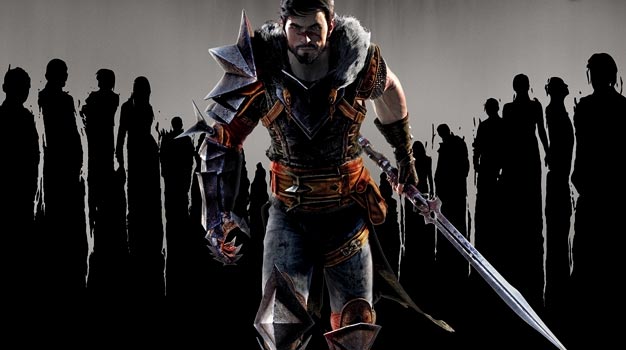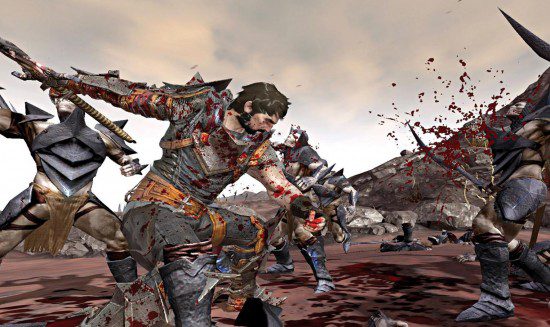When Bioware released Dragon Age: Origins, an ode to their early days of fantasy RPG’s, it was received better than expected across all platforms. There were complaints aplenty, but the immersive world of Ferelden and the cast of deep, emotionally engaging characters captured the hearts of millions. The announcement of a sequel failed to surprise anyone. Bioware acknowledged from the start that they aimed for a more console based experience, and they decided to narrow the lead character to a single noble known as Hawke, leading to some fear and trepidation among the gaming community. Yet with such a sterling track record, few held anything but high hopes.

the man, the miss, the legend
The story of Dragon Age II runs somewhat concurrent with the original, taking saved data from those that played through Origins and peppering it in throughout the game. However, instead of trekking across the vast expanses of Ferelden, Hawke and his (or her) companions stick to the events within the city of Kirkwall. Darkspawn raided and destroyed Hawkes home city of Lothering, and so you are forced to usher your family to presumed safety inside the walls of Kirkwall. The tale of Hawke is told entirely through the eyes of one of your companions, Varric, who is relaying the story under duress to a leader of the Chantry, the religious zealots encountered in Origins, and a main antagonist for Hawke. The character of Varric spices up the journey from time to time, and the interventions of the Chantry interrogator to keep Varric from embellishing help to add humor and life to the story.
While typical fantasy games, Origins included, tend to focus on a Tolkein-esque “big bad,” Dragon Age II attempts to make the story more personal by focusing on the events of a single city and the ramifications of your choices. There are areas outside Kirkwall, but your ability to traverse them is stunted to what part is needed for each quest. Most quests require you to run through a cave or dungeon, but there are only two maps for each cave. While each one has a different enemy set or a different exit point, once you know one, you can run through them with your eyes closed. The city itself is just as repetitive. There are only a few spots to visit on the map, the only variation being night and day. Continually running back and forth between two or three spots for a single quest tends to become mind numbing, especially when the story to justify those quests fails to entice.
The choice of staying in Kirkwall narrows down the tale of Dragon Age into insignificance. The incredible part of the original was its sweeping narrative and the emotional force behind the characters and their terror at the world crumbling down around them. Hawke seems to serve only as a cheap courier. The story never seems to go beyond your next fetch quest, and the political machinations that turn the wheels never seem to be important, or at all engaging. I spent the first act, around 7 hours of play, wondering when the real story would start. When events finally culminated, I was so worn out from pointless running between the same areas that it failed to feel impactful, I just wanted it to be over.

Hawke is coming to get ya!
Communication between Hawke and the citizens has been overhauled to more resemble Mass Effect, with icons representing each choice as political, forceful, snide or humorous. Since Hawke has a voice, unlike the Hero of Ferelden, these choices can become fairly amusing. The voice acting is top notch, and while many of the quests seemed mundane, the dialogue between them managed to bring a few smiles to my face. Likewise, the interactions between your party while questing is also deftly handled. It is often worth stopping and just listening to the characters you bring with you. While nothing reaches the level of Morrigan and Alistair banter, your party helps to flush out what story there is in the game, as well as opening up new options for dialogue and new quest options. Your party also learns to love or hate you through your choices, and once again, your romantic options are dictated by how much your Prince or Princess Charming likes you. This time around, gifts have much less of a part to play in their feelings for you, but much more is placed on your choices, even the most innocent.
Dragon Age II doesn’t just retool how it tells the narrative; it also retools the combat system from its predecessor. The responses to the combat system in the first game were mixed. Console players were given a drastically different set up than PC players, and there were many console players that balked at how it worked. Bioware decided to tailor the combat to consoles this time out. Instead of having an auto-attack function as default, players much actively choose each strike. The combat wheels are still here, giving you direct and immediate control over your squad members, but by forcing a more active combat system, much of the tactical immediacy is stripped away. Players can still set up responses to situations in the characters menu, which is essential since none of your party members are able to take a healing potion without direction, but these options are also reduced from the original. The lack of options leads to initial frustrations since the AI of your party simply can’t keep up with a button mashing approach. Much of the first act is simply trial and error on the part of your squad, and without getting the right mix, later battles can become a nightmare. Once mastered, however, the combat can become kinetic enough to drive you through the slower parts of the game.
While Dragon Age II is a beautiful game, and the story and world of Ferelden is as rich as anything in gaming, the game ends up feeling like a cop out. The gameplay is absolutely solid, and once I mastered my squad, the combat kept me going, but the story couldn’t stack up. Being caged in such a small area with such small quests makes the game feel far more like an expansion than a game. I felt like I had simply completed a chapter of the first game, not crafted something new. The new characters were fun and enjoyable, but not nearly as compelling and rich as those from the first game. The new race, the Qunari, show so much promise, but your interaction with them only shows you a glimpse of who and what they are. For fans of the original, the game will feel hollow. I enjoyed my time with Dragon Age II for the combat and the occasional reference to its predecessor, but new players will find almost nothing to grab onto. It isn’t a complete miss, but Dragon Age II has a hard time holding itself up as a premier fantasy RPG, especially considering whose stable it came out of.
Review
| Pros | Cons |
|---|---|
| Fast combat, beautiful world, fun characters | no story, no feeling and nothing to drag the player in |
| Rating |


